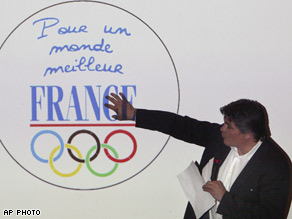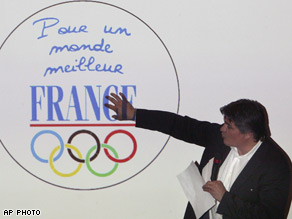|
|
【08 .4 .9 美国 cnn】
【媒体出处】http://edition.cnn.com/2008/SPORT/04/08/oly.athletes.ap/index.html
【中文翻译】 未翻译
【全文内容】

Politics divides Olympic athletes
- Story Highlights
- Olympic charter bans demonstrations tied to political, religious, racial issues
- Top athletes such as Roger Federer unsure it's their place to protest at Olympics
- Some athletes believe Olympics offers rare global stage to air opinions
PARIS, France (AP) -- Around the globe, athletes are plodding on lonely training runs, sweating in gyms and straining in pools, united by a common goal: to be faster, higher and stronger at the Beijing Olympics.
But there's no unity when it comes to protests, boycotts and political demonstrations -- over Tibet or other human rights issues in China.
Some argue the Olympics should be free of politics, while others say athletes with a conscience must speak out. And still others are unsure how to react or seem uncomfortable with the whole thing.
Asked if he would wear a ribbon for Tibet or boycott the opening ceremony, top-ranked tennis star Roger Federer said: "No, not so far. I don't think I will."
"Honestly, I don't know enough about the situation. I don't know how much we athletes should be involved in this," said Federer, of Switzerland. "It should be a celebration of sport and not using it for political reasons."
Fellow player James Blake believes any protest should not be an individual call.
"I don't feel like it's my decision to go and say, 'I know what's best for the entire country of China, I know what's best for the entire Olympic team,"' the American said. "I think it should be a joint decision, kind of all-for-one decision, whether every Olympic team boycotts or we all go and we represent our country with pride."
"I've worked hard. I would love to be there. I'm proud to be a part of the U.S. Olympic team," he added. "If they tell me it's the right thing to do to go over there, I'll go over there. If they tell me it's the right thing to do to stay home, then I'll stay home. I would be disappointed, because I want to compete in the Olympics and I want to be there."
Weighing on athletes' decision-making is Rule 51, subsection 3, of the Olympic Charter, which says: "No kind of demonstration or political, religious or racial propaganda is permitted in any Olympic sites, venues or other areas."
In short, athletes who pull out "Free Tibet" banners in Beijing could be sent home.
The U.S. Olympic Committee has asked its athletes to comply with Olympic rules, and said no extra measures would be imposed.
French athletes consider options
For the moment, athletes pushing for a more activist approach seem to be in the minority. French pole vaulter Romain Mesnil, who rejects the "activist" label, has recently been sounding out others about ways to show their commitment to human rights.
He says China's action in Tibet was a turning point for him. Initially, he suggested athletes wear a green ribbon or other symbol -- something both discreet and visible -- when competing.
That evolved into a badge, marked "For a better world," that Mesnil and nearly two dozen current and former French athletes unveiled last week. They want the International Olympic Committee to let them wear it in Beijing, a request that could come up in Olympic officials' discussions this week on how to interpret and apply Rule 51 at the games.
Mesnil says an athlete boycott of the opening ceremony also "is very interesting" and "can be one of the possibilities."
German fencer Imke Duplitzer has said she will not take part in the ceremony if she qualifies. Cyclist Thor Hushovd of Norway told his country's Faderlandsvennen newspaper that he, too, could join such a protest.
"As actors at the games, we have to make ourselves heard. As athletes, we have to display Olympic values and human values," Mesnil told The Associated Press. "We don't want to be mere pawns. In the current debates, we get a little bit of the impression that we are being told, 'You athletes do what you have to do, and let us take care of the rest. It is not your problem.' I say no."
Another sign that France's delegation might be one to watch for protests in Beijing came from a survey last week in Sport magazine.
The magazine said it asked 126 athletes who either qualified or who could qualify for the Olympics and Paralympics, and that nearly half said they were ready to skip the opening ceremony. A third said they'd be willing to wear a Tibet flag **** at the games, three-fourths supported Mesnil's campaign, and nearly half expressed hope that French President Nicolas Sarkozy will make good on his threats to boycott the opening ceremony.
Mesnil said that if enough athletes wear the same symbol in Beijing, the IOC could not throw them all out.
He also added that despite the charter's ban on propaganda and demonstrations, "there's already a degree of tolerance toward religious signs: at the minimum, athletes who wear crosses, but also athletes who make the sign of the cross at the start of a race or who get down on their knees and pray at the end of the race."
"That's already tolerated, so why not tolerance toward a symbol showing the value of human rights?" Mesnil said.
'Politics and sports should always be separate'
But there are many who have no plans to speak out, saying it is not their role, that they are too busy training, or that they want to keep the games focused on sports. Even though there is no momentum internationally for a boycott of the entire games, athletes are concerned their years of toil could go to waste.
U.S. softball player Stacey Nuveman said she hopes there is no boycott.
"I have my own concerns from a personal standpoint, and I don't like what's happening necessarily (in China). But I also don't believe it's my place as an individual to take that next step," she said.
"I know there has been a lot going on with the torch process and it moving from Athens to Beijing and the possibility of protests. God bless them. People have a right to do that (protest), especially in the U.S.," the La Verne, California, catcher said.
"At the same time, I am a softball player, my goal is to win a gold medal and I hope there is nothing to distract me from that end. I think that is true of all athletes."
U.S. sprinter Sanya Richards said "politics and sports should always be separate."
"Anytime you mix sports and politics, the athletes usually lose out," said Richards, who won gold in the 2004 Athens Olympics in the 1,600 relay. "That's what happened in 1980 when we boycotted and nothing came out of it."
'I think there are other ways to help'
Olympic floor gymnastics gold medalist Kyle Shewfelt of Canada said on his Web site that the games should be about the athletes.
"Why is it OK to even consider sacrificing athletes' dreams on behalf of making a statement?" he wrote.
"I know that there are some human rights violations taking place in Tibet and the Dalai Lama is speaking out. This sounds so naive and jaded, but there is only so much time in the day and I have been spending most of mine preparing myself to be at my peak in August," Shewfelt said.
Italian world champion swimmer Filippo Magnini noted that there have been thousands of deaths since 1959 in Tibet and China.
"I don't see why there should be protests only now. Just because of the Olympics? There should have always been protests," Magnini told the AP. "They used to stop wars for the Olympics and now they want to stop the Olympics, it doesn't seem right."
Two-time taekwondo Olympic gold medalist Steven Lopez of Sugar Land, Texas, sees a boycott of the opening ceremony as "a negative."
"As an individual, I take great pride in representing my country, to be able to wear USA on my back," he said. "I don't think that would help the situation. I think there are other ways to help the crisis in Sudan, Darfur or Tibet."
Amelie Mauresmo said the IOC shares some blame for giving the Olympics to China.
"It gets on my nerves that we athletes are the ones who are going to have to do something about the human rights and things in Tibet," the 2006 Wimbledon and Australian Open champion said. "The people in the IOC should have never let Beijing in these conditions be the host city for the Olympics. Or make sure things are going to be right."
[ 本帖最后由 Truth-home 于 2008-4-15 02:00 编辑 ] |
-

评分
-
1
查看全部评分
-
|